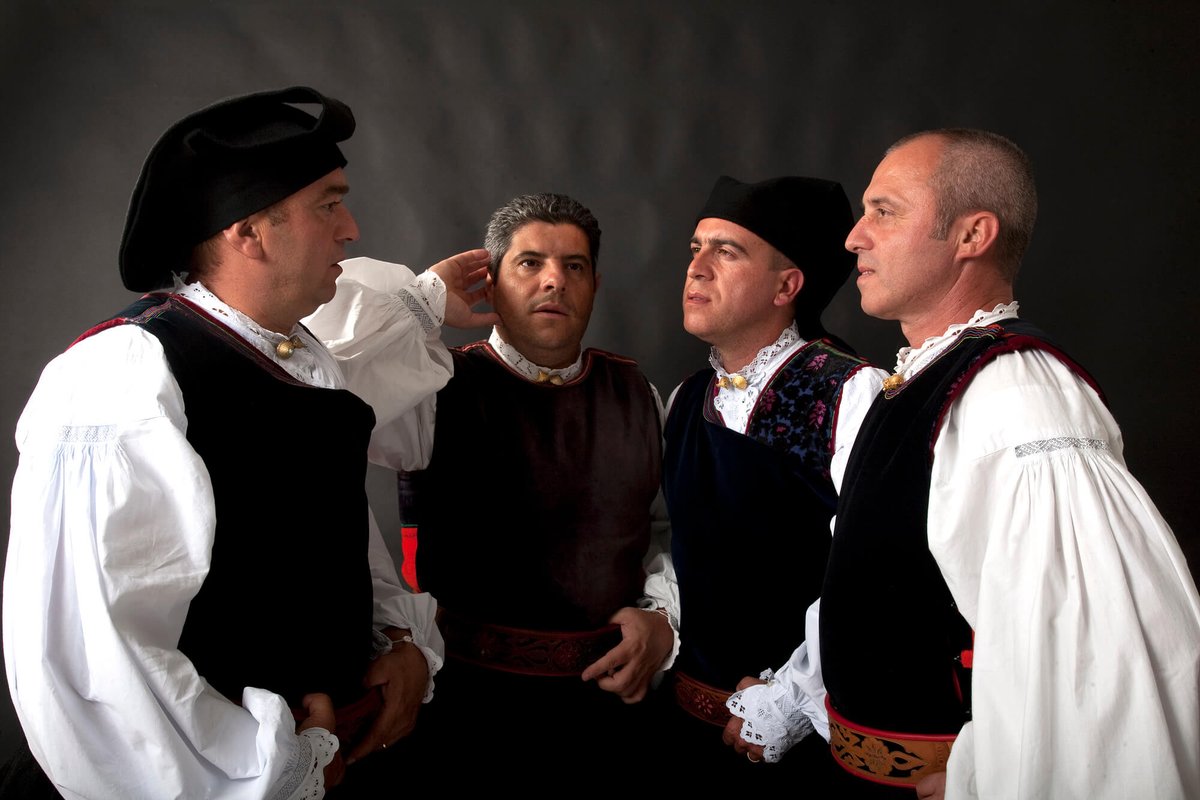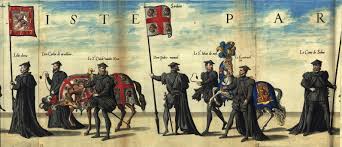
**Sardinian STEREOTYPES and criminal anthropology**
From Cicero to criminal anthropology, all the insults and harmful ideologies Sardinians had (have) to face.
📸 A couple of Sardinian bandits.
From Cicero to criminal anthropology, all the insults and harmful ideologies Sardinians had (have) to face.
📸 A couple of Sardinian bandits.

This is going to be a little heavy topic, involving different kinds of discrimination.
The first ones who had something to say against Sardinians were the Romans, who didn't manage to fully take control of the people. Native people still attacked Roman settlements from-
The first ones who had something to say against Sardinians were the Romans, who didn't manage to fully take control of the people. Native people still attacked Roman settlements from-
-their own refuge in the inner mountains of Sardinia. The Romans called them barbarians, because they did that to everyone, and the modern name of Barbagia derives from that. But the stereotype wasn't only for the people inhabiting the mountains, but for all Sardinians.
We have proof in the famous words of Cicero, who was defending a man accused of rape. The witnesses were Sardinians and he claimed they weren't reliable because they were bandits and criminals. Btw, he also claimed the woman who suffered rape was too old to "excite" any kind of-
-intercourse and as far as I know, they gave him reason.
From Roman sources we also have "fur-wearing Sardinians" and "criminals" of any kind. These stereotypes stuck since then until modern days, with the inclusion of the equality of Sardinian=shepherd, since that was a common-
From Roman sources we also have "fur-wearing Sardinians" and "criminals" of any kind. These stereotypes stuck since then until modern days, with the inclusion of the equality of Sardinian=shepherd, since that was a common-
-job for many.
Sardinia was also a prison island for the Roman empire, therefore being moved to Sardinia for job was/is considered a punishment.
The central regions of Sardinia always kept a mistrustful attitude towards the rulers that came and went, leading people to stick to-
Sardinia was also a prison island for the Roman empire, therefore being moved to Sardinia for job was/is considered a punishment.
The central regions of Sardinia always kept a mistrustful attitude towards the rulers that came and went, leading people to stick to-
-the stereotype of bandits and criminals. Banditism is a larger topic though, which needs more depth and a certain touch, and I will probably talk about it another time.
Sardinians have stereotypes against each other too, like the perennial fight between north and south and the-
Sardinians have stereotypes against each other too, like the perennial fight between north and south and the-
-consequent insults which sounded like "the Africans of south Sardinia". We're well into the 19th century and racism was rampant.
Sardinia began to be seen as a mysterious and exotic land, inhabited by backward people and filled with dangers (bandits, again). This is clear in-
Sardinia began to be seen as a mysterious and exotic land, inhabited by backward people and filled with dangers (bandits, again). This is clear in-
-the works of non Sardinian (as born outside the K. of Sardinia) people of the time, mostly British travellers.
The twist of 19th century came with the birth of criminal anthropology by Cesare Lombroso. For a long time already, people tried to find physical and, today we would-
The twist of 19th century came with the birth of criminal anthropology by Cesare Lombroso. For a long time already, people tried to find physical and, today we would-
-say genetic, evidence of criminal traits in "races".
The first to lead studies on Sardinians was Gillebert d'Hercourt in 1850, who studied anthropological details which, even if not marked as negative traits, led him to identify a "savage" component. He also said Sardinians -
The first to lead studies on Sardinians was Gillebert d'Hercourt in 1850, who studied anthropological details which, even if not marked as negative traits, led him to identify a "savage" component. He also said Sardinians -
-were generally short (kind of true), healthy and intelligent, with a certain level of insolence.
Charles Letourneau claimed Sardinians were the only European people who didn't undergo civilisation. This is when a "racial" connotation appears.
Charles Letourneau claimed Sardinians were the only European people who didn't undergo civilisation. This is when a "racial" connotation appears.
Cesare Lombroso is infamously known for his theories of the "criminal by birth", where people with certain physical connotations were seen as criminals with no chance of redemption (even if they never committed any crime). He went ahead studying the shapes and measures of-
-people's skulls and so on.
Following his lead, Alfredo Niceforo applied the theory to Sardinians. Niceforo was a Sicilian man (and Sicilians have had their own good deal of stereotypes) who came to Sardinia at the end of the 19th century with the intention to study -
Following his lead, Alfredo Niceforo applied the theory to Sardinians. Niceforo was a Sicilian man (and Sicilians have had their own good deal of stereotypes) who came to Sardinia at the end of the 19th century with the intention to study -
-anthropological traits. He measured people's skulls and "deducted" that Sardinians of the Barbagia, Ogliastra and part of Campidano leaned to criminal acts. Not only he claimed that derived from physical connotations, but he expanded Lombroso's theory by claiming the existence-
-of a Sardinian race, which due to the mixture between European and Mediterranean races, made Sardinians a particularly nasty race made of criminals.
This is obviously quickly dismantled by the reports of La Marmora of some decades earlier, where he recorded southern-
This is obviously quickly dismantled by the reports of La Marmora of some decades earlier, where he recorded southern-
-Sardinians were more likely to turn to court to solve their problems and banditism was a phenomenon mostly restricted to Barbagia, Baronia and Gallura, and often in response to the politics of the Kingdom of Sardinia.
We also know that Sardinians were usually made fun of when-
We also know that Sardinians were usually made fun of when-
-travelling to the "Continent" in their traditional dresses, which were just their everyday dresses. People in the streets would turn around and chase them, creating a whole party of people curious about the "exotic".
These stereotypes remained for a long time, studied again-
These stereotypes remained for a long time, studied again-
-and brought back in anthropological studies, and we still have to face them today, as shown by some people's claims and by what we see at the TV.
Final clarification: there isn't a Sardinian "race", but Sardinians are recognised a separate ethnic group from the rest of Italy.
Final clarification: there isn't a Sardinian "race", but Sardinians are recognised a separate ethnic group from the rest of Italy.
• • •
Missing some Tweet in this thread? You can try to
force a refresh












